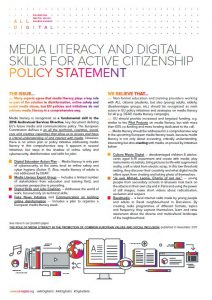27 Sep ALL DIGITAL Policy Statement on Media Literacy and Digital Skills for Active Citizenship
27 Sep, 2018
 On 27 September ALL DIGITAL and MEP Emilian Pavel organised a policy debate at the European Parliament ‘Media Literacy and Digital Skills for Active Citizenship‘ where the statement was announced.
On 27 September ALL DIGITAL and MEP Emilian Pavel organised a policy debate at the European Parliament ‘Media Literacy and Digital Skills for Active Citizenship‘ where the statement was announced.
The issue…
… Many experts agree that media literacy plays a key role as part of the solution to disinformation, online safety and social media abuse, but EU policies and initiatives do not address media literacy in a comprehensive way.
Media literacy is recognized as a fundamental skill in the 2016 Audiovisual Services Directive, key document defining EU’s future media and communications policy. The European Commission defines it as all the technical, cognitive, social, civic and creative capacities that allow us to access and have a critical understanding of and interact with media. However, there is no action plan or policy initiative addressing media literacy in this comprehensive way. It appears in several initiatives, but stays in the shadow of online safety and cybersecurity, disinformation and skills for jobs:
- Digital Education Action Plan –> Media literacy is only part of cybersecurity, at the same level as online safety and cyber hygiene (Action 7). Also, media literacy of adults is not addressed by DEAP.
- Media Literacy Expert Group –> Includes a limited number of stakeholders from education and training field, and consumer perspective is prevailing.
- Digital Skills and Jobs Coalition –> Addresses the world of work, focused only on technical skills.
- Fake News Initiative and Communication on tackling online disinformation –> Includes a plan to organize a European media literacy week.
We believe that…
… Non-formal education and training providers working with ALL citizens (students, but also (young) adults, elderly, disadvantages groups, etc.) should be recognized as main actors in EU policy initiatives and strategies on media literacy for all (e.g. DEAP, media literacy campaign).
… EU should provide increased and targeted funding, e.g. similar to the Pilot Projects on media literacy, but with more than 60% co-funding and more funding dedicated to the call.
… Media literacy should be addressed in a comprehensive way in the upcoming European media literacy week, because media literacy is not only about accessing, critically understanding, interacting but also creating with media, as proved by initiatives below:
- Culture Meets Digital – disadvantaged children & adolescents aged 6-18 experiment and create with media: play instruments via tablets, bring pictures to life with augmented reality, craft a robot from electric scrap. In this low-threshold setting, they discover their creativity and what digital media offers apart from chatting and taking phots of themselves.
- “Je suis Ahmed, Leonie, Charlie of net nie.” – young people from secondary schools in Brussels look back on the attacks in their own city and in Paris and using the power of still images, make short videos about radicalization, exclusion and respect.
- Ravalmedia – a local internet radio made by young people and adults in Raval neighbourhood in Barcelona. By creating radio programmes of different formats, topics and frequency, they express themselves, learn and raise awareness about the diverse and multicultural landscape of the neighbourhood. See more in our position paper THE ROLE OF MEDIA LITERACY IN THE PROMOTION OF СOMMON EUROPEAN VALUES AND SOCIAL INCLUSION, published in November 2017
Get the PDF version of the Policy Statement









